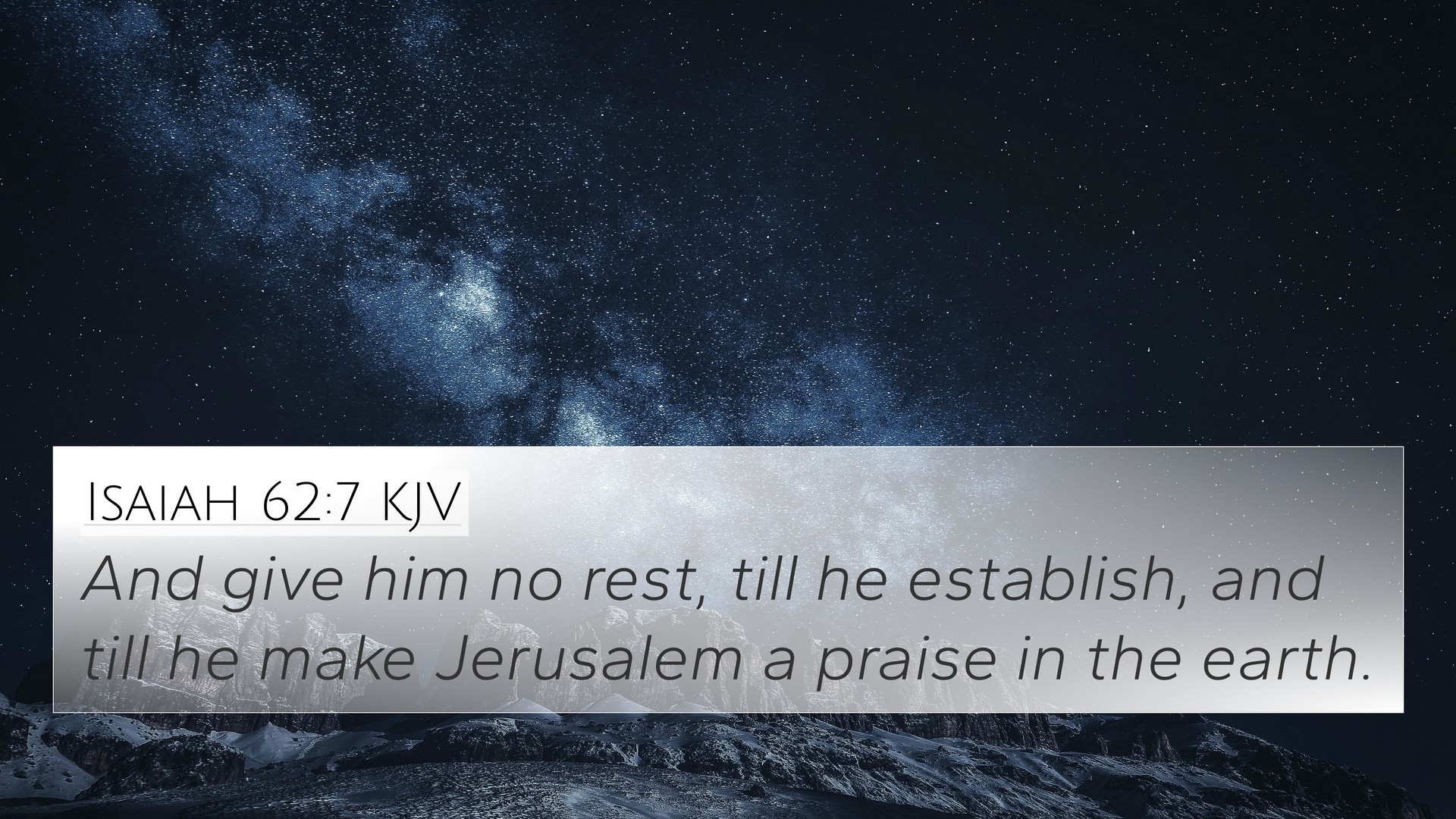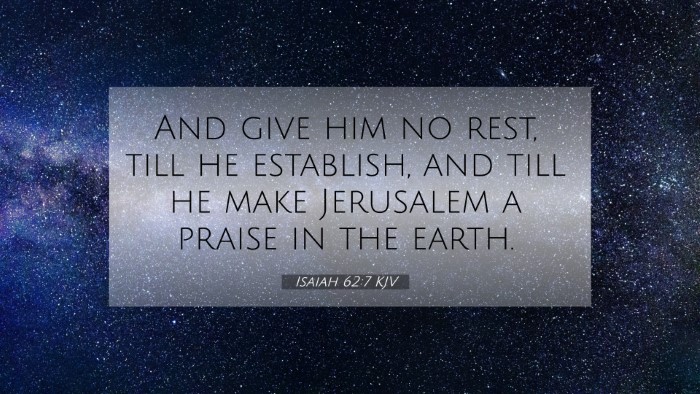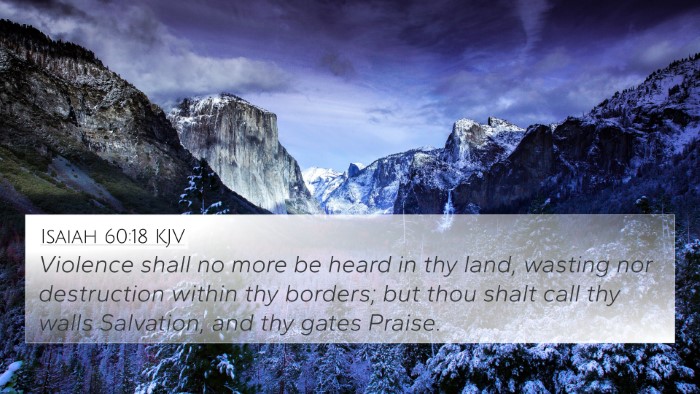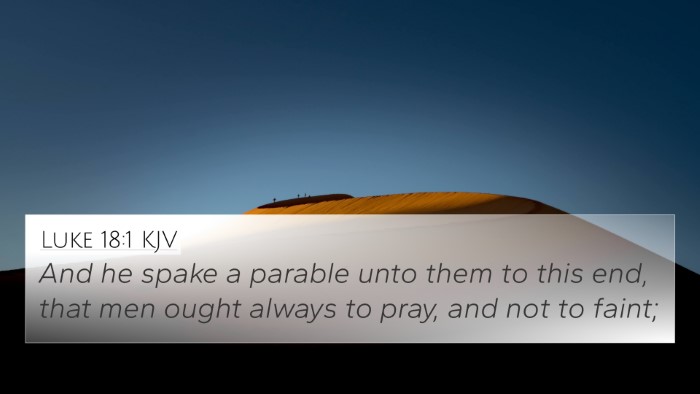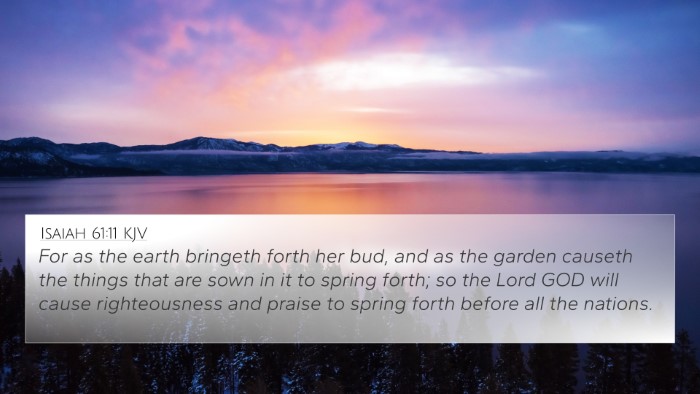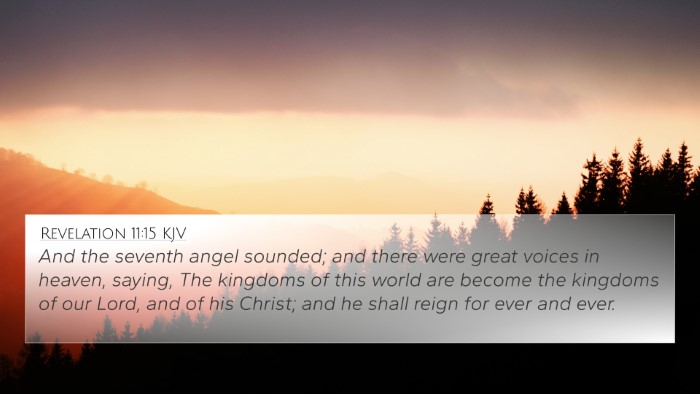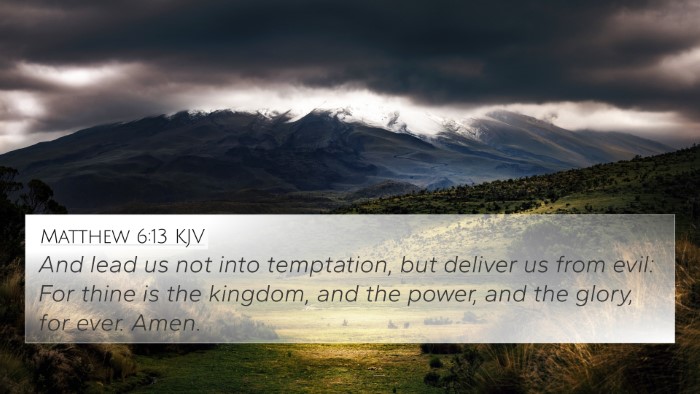Understanding Isaiah 62:7
Verse: "And give him no rest, till he establish, and till he make Jerusalem a praise in the earth." (Isaiah 62:7)
Overview
The verse Isaiah 62:7 serves as a divine instruction regarding persistent prayer and intercession for the people of Jerusalem. It highlights the importance of relentless supplication in seeking God's favor and the eventual restoration of His people. Various public domain commentaries provide deep insight into the meaning of this scripture.
Commentary Insights
Matthew Henry's Commentary
Matthew Henry emphasizes the urgency of seeking God on behalf of His people. The phrase "give him no rest" indicates a call to ongoing prayer, not allowing God to be silent until His promises concerning Jerusalem are fulfilled. It encourages believers to passionately pursue God with their requests, signaling that God desires diligence in prayer.
Albert Barnes' Notes
Albert Barnes interprets this verse as a prophetic call for intercessory prayer, suggesting that the servants of God should be tireless in their appeal to Him. Barnes notes that the phrase "till he establish" is indicative of the awaited restoration where Jerusalem will be exalted among the nations, reflecting God's glory. This also alludes to the future messianic kingdom where God's people would be fully restored.
Adam Clarke's Commentary
Adam Clarke expands on the idea of giving God no rest, explaining that this is an invitation for God's people to engage in constant communication with Him. Clarke points out that Jerusalem symbolizes not just a city, but represents God's covenant people who are to become a "praise in the earth," signifying their role in bearing witness to God's glory and righteousness.
Significance of Persistent Prayer
Isaiah 62:7 outlines a significant prayer principle, urging believers to engage fervently in prayer until God's promises manifest. This notion of persistence in prayer underscores a deeper theological understanding that God expects His people to advocate for His work on earth, especially regarding the state of His chosen people, Jerusalem.
Cross-References
To further understand the context and implications of Isaiah 62:7, consider the following cross-references:
- Psalm 122:6: "Pray for the peace of Jerusalem: they shall prosper that love thee." This verse encourages prayer for Jerusalem.
- Jeremiah 29:7: "And seek the peace of the city whither I have caused you to be carried away captives, and pray unto the Lord for it." A parallel theme of interceding for Jerusalem.
- Luke 18:1: "And he spake a parable unto them to this end, that men ought always to pray, and not to faint." Advocating for persistent prayer in the New Testament context.
- Romans 10:1: "Brethren, my heart's desire and prayer to God for Israel is, that they might be saved." Connection to the burden for God's people.
- Ezekiel 36:37: "Thus saith the Lord God; I will yet for this be enquired of by the house of Israel, to do it for them." God’s desire for His people to seek Him.
- Matthew 5:14: "Ye are the light of the world. A city that is set on a hill cannot be hid." A thematic connection to the visibility of God's people.
- Revelation 21:2: "And I John saw the holy city, new Jerusalem, coming down from God out of heaven." A prophetic culmination of God’s purpose for Jerusalem.
Thematic Connections
This verse can be part of thematic Bible verse connections that highlight several themes:
- Persistent Prayer: Exemplified through the urgent call to intercede for Jerusalem.
- Intercession: The role of God's people as advocates in prayer.
- Hope for Restoration: Assurance of God’s faithfulness to His promises.
- Responsibility of Believers: Engaging actively in the spiritual well-being of their communities.
Practical Application
For modern believers, Isaiah 62:7 serves as a challenge to uphold relentless prayer and intercession, particularly for areas of spiritual need, justice, and God’s glory manifesting in our communities.
By engaging in cross-referencing biblical texts, believers can deepen their understanding of scripture and enhance their study of God’s Word. Employing tools for Bible cross-referencing such as concordances and thematic studies assists in revealing connections between different passages, shaping a more comprehensive view of biblical themes.
Final Thoughts
Isaiah 62:7 is not just a call to prayer for Jerusalem; it embodies the essence of an active faith, where believers are encouraged to be tireless in their pursuit of divine promises. By exploring cross-references and understanding their contextual ties, one can appreciate the intricate dance of divine sovereignty and human responsibility in the life of faith.
